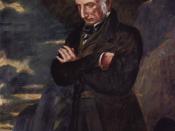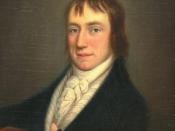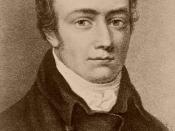ROMANTICS
Romanticism was a movement of thought and writing which began in Germany and England at the same time towards the and of the 18th century in reaction against neo-classicism. During that time there were a lot of political and industrial movements and changes. Romantic writers did not like the changes, which were occurring around them, which perhaps explain why they did not often speak of the new industrial society in their works preferring to concentrate on nature or their own feelings. In this paper I will first talk about the things romantics were interested in and then the two different generations of romantics.
Basic concerns of the Romantics in this period were;
Simple language
Incidents and situations from common life
Coloring of the imagination
Ordinary things presented to the mind in an unusual aspect
Making these incidents and situations interesting by tracing them
Associating ideas in a state of excitement
Humble and rustic life
Because of the spiritual possibilities which the Romantics believed human feelings offered, sentiment had an almost religious significance.
They loved all extreme natural phenomena; high mountains, violent storms, torrential rivers, anything that had terrible beauty.
There were two generation of romanticism the first generation are William Blake, William Wordsworth, P. Coleridge, Robert Burns. And the second generation is Shelley, Keats, and Byron.
Wordsworth is the most famous of the romantic poets and his most productive years took only ten years although he had lived 80 years. He was a great supporter of French Revolution. The main differences between Coleringe and Wordsworth is that Coleridge believes in education and was fond of reading whereas Wordsworth believes in the education of nature and did not believe in books. Together they wrote Lyrical Ballads most of the ballads are anonymous, they were songs and transmitted orally. Events...



Romanticism
This isnt finished. You have not looked into this fascinating subject in any detail and I was extremely disappointed to see that you have used references to very few poems and no quotes to elucidate your points
7 out of 8 people found this comment useful.